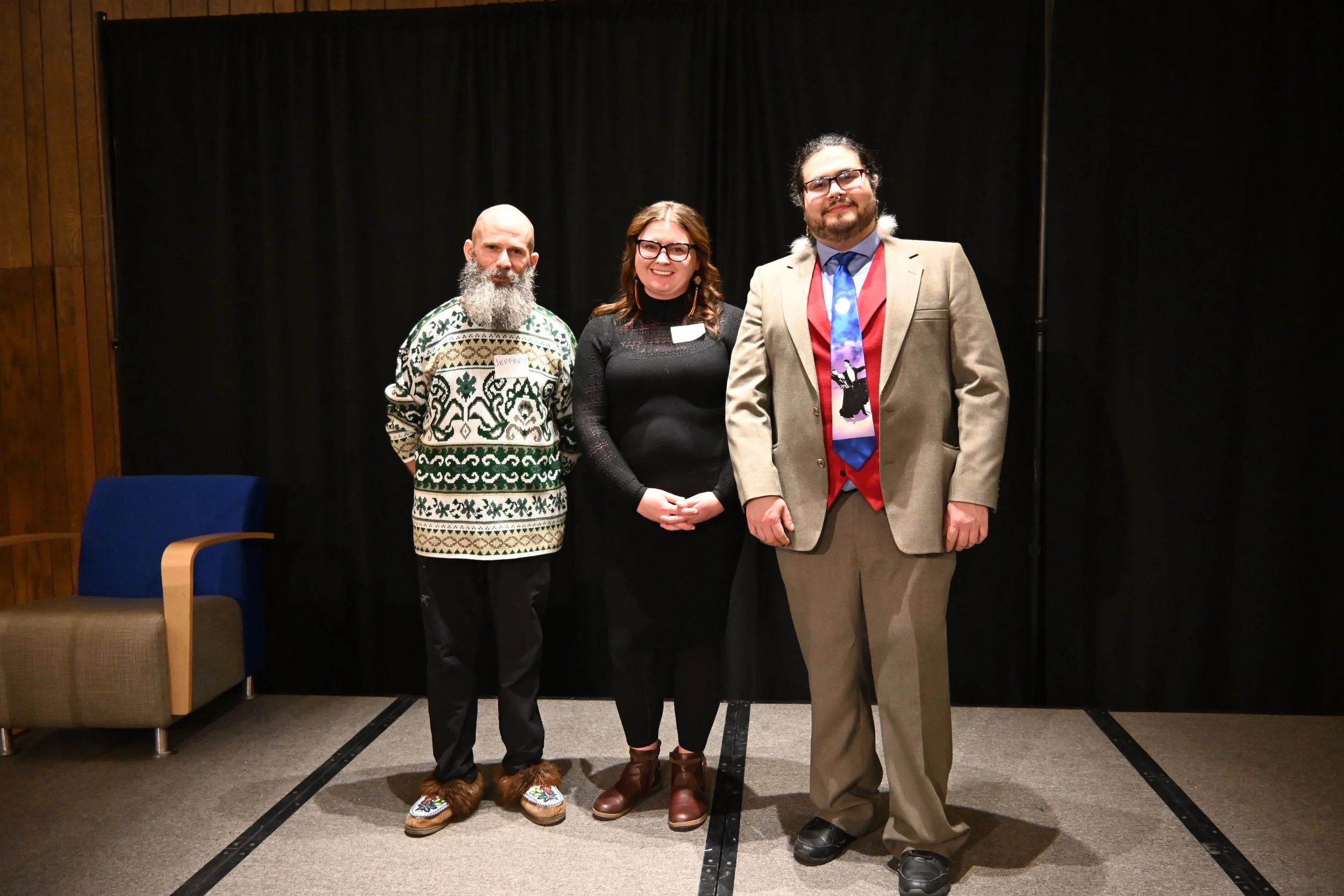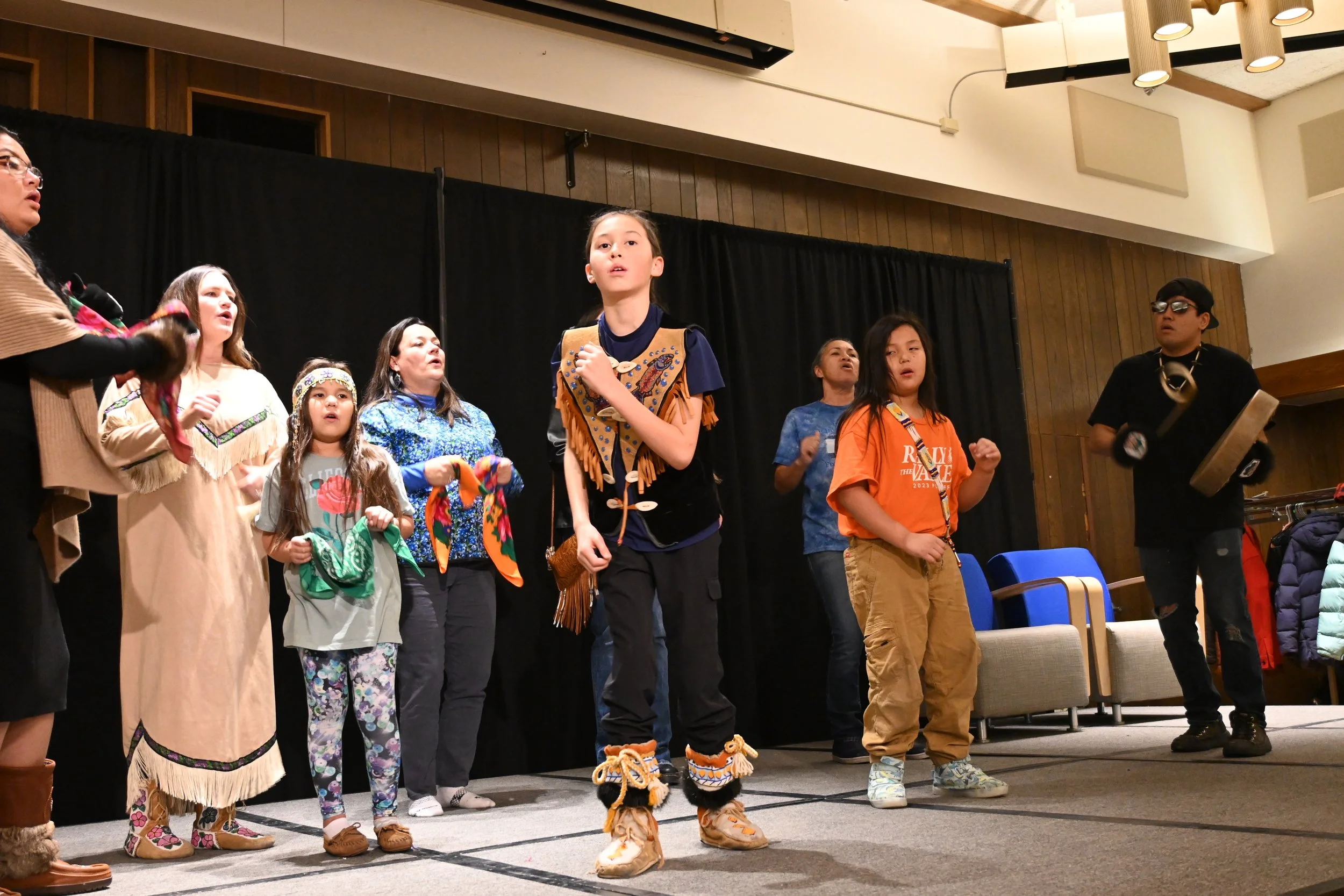Northern Center cashes in on community
After financial turmoil, staff furlough, Northern Center squares its debts with help from the Alaska Conservation Foundation and ‘Night for the North’ event
By Anna Lionas and Colin A. Warren
The Northern Alaska Environmental Center is moving forward with a recovery plan after paying off debts following near financial ruin. At the beginning of September, following a separation with their executive director, board members said they discovered there was not enough funds for payroll. This led to the furloughing of the entire staff and pausing on all programs.
Photo by Colin A. Warren
The board of directors for The Northern Alaska Environmental Center addressed the crowd together at their fundraiser auction event held Nov 21, 2025 at the University of Alaska Fairbanks. From left to right: Jeffery Groenke, vice president and treasurer, Krystal Lapp, president, and David Leslie, secretary.
Former staff members claim that the board was aware of financial and leadership issues before September.
The board stated that while finances were negligently handled, there was no malfeasance.
“It's just when you are spending more than what you're bringing in over the course of multiple years, it eventually catches up with you. And so we came to that point a few months ago. It has caught up to us,” Board President Krystal Lapp said.
The policies in place were not sufficient to prevent financial “unraveling,” according to the board.
From 2020 to 2021, revenue grew rapidly, more than doubling from $412,000 to $1.1 million, according to tax forms. Yet, in spite of the growth, the Northern Center only netted $100,000 that year and lost $107,000 in 2019, $135,000 in 2020, and $180,000 in 2022, respectively. The executive director, Elisabeth Dabney, earned $100,000 in 2023.
A financial audit conducted by the board revealed over $100,000 in promised grant income was never applied for, a $15,000 grant that was discovered to be a loan. It remains unclear why Dabney did not apply for the grants. Two credit cards were also revealed with limits at $25,000 and $85,000, one had an outstanding balance of $11,000.
“I'm not seeing anything of anyone being outright nefarious and anything,” Lapp said.
The board confirmed no legal action will be taken for the mishandling of monies.
After discovering a sea of red ink, the adrift board needed their community to stay afloat.
Through their long-standing partnership with the Alaska Conservation Foundation, or ACF, Northern Center’s debts have been paid off. By tapping into their endowment fund with ACF they are square on things, now they’re looking to restore programming and get back to operations.
Lapp confirmed two employees were offered their jobs back; both rejected the offer and the staff page on the Northern Center’s website is empty. There are no plans to look for a new executive director yet, they will continue to lean on the help of volunteers and members.
On Friday, Nov. 21, the Northern Center held their marquee fundraising auction event, Night for the North, pairing with the Arctic and Northern Studies program as hosts. They raised over $20,000 to go toward monthly costs, contractors, looking into fellowship programs and other operational needs.
“This event’s a really great annual tradition, and brings people together, and it’s really a fun way to support all the environmental and advocacy work that the Northern Alaska Environmental Center does,” State Representative Ashley Carrick said while waiting in line to enter the event. “The silent auction is really awesome.”
Photo by Colin A. Warren
Dene’ Eslaanh Native dancers take center stage during the ‘Night for the North’ event held at the Wood Center ballroom.
People placed bids on artisanal cakes, fur-ruffed parkas, Dennis Witmer photography, ulus, coffee makers, a mallard painting, and much more. Over 100 supporters bulged the confines of the Wood Center ballroom at University of Alaska Fairbanks with extra tables and food brought in at the last minute because they sold so many tickets. The evening kicked off with the Dene’ Eslaanh Native dancers performing on stage, eventually getting the entire audience to join them.
“Its really amazing to see this many people showing up and supporting the fight for Alaska's land, waters and wildlife,” Northern Center Board Member David Leslie said.
Then, the board gave the crowd an update. The words “accountability,” “ trust,” and “rebuilding” were used multiple times.
“We were reestablishing our operation theory and as we began to restore a stable ethical and sustainable organizational culture,” Lapp said.
Throughout the organization’s pause, they’ve remained active in all their litigation. The Northern Center is currently a client on three cases: one against the Trump Administration on executive orders to open oil drilling in the Arctic Wildlife Refuge, another challenging federal Ambler Road approvals and a lawsuit challenging the Trump administration’s 2020 management plan for the Western Arctic that they settled after the Biden administration adopted a more protective plan.
The Northern Center will likely see a shift in their organizational structure, but what that looks like is yet to be determined. They’re working with The Foraker Group, an Alaska nonprofit whose core purpose is to strengthen nonprofits, and other groups to bolster their efforts around new bylaws and fiscal sponsorship practices. Currently, they have a slew of committees – elders, facilities/building, financial transition, governance, events, and issues – that they’re counting on to right their ship.
“Our commitment going forward is to maintain the standard always to protect this organization, not only from financial instability, but from ever losing the trust of the community that we serve, because NAEC is mission is too important and Alaska's environmental challenges are too urgent for anything less,” Northern Center Board Member Jeffery Groenke said.
This story was written in collaboration between the Fairbanks Daily News-Miner and The Sun Star.



